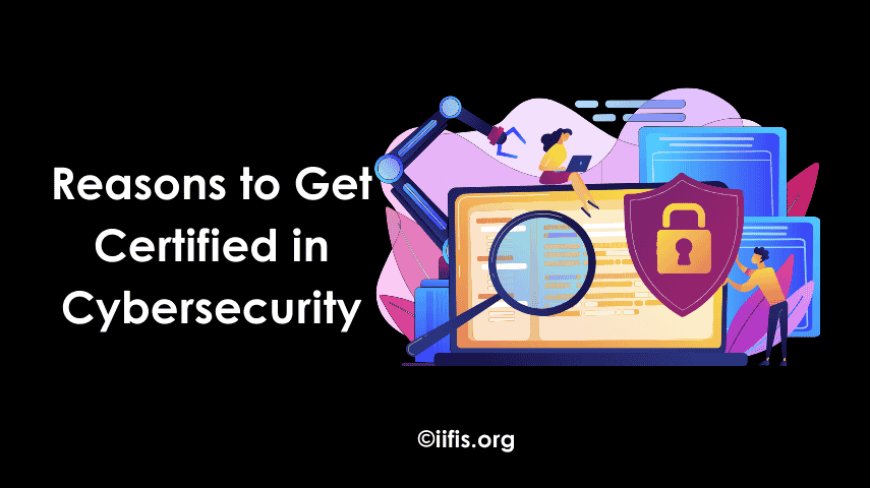Top Reasons to Get Certified in Cybersecurity
Discover the top reasons to get certified in cybersecurity, including enhanced job opportunities, increased earning potential, and specialized skills to stay competitive in today’s digital world.

In an era where digital threats are more common, cybersecurity has emerged as a critical field for protecting sensitive information and maintaining organizational integrity. Obtaining a cybersecurity certification improves your knowledge and skills and significantly boosts your career prospects. With employers increasingly seeking professionals equipped to handle the complexities of cybersecurity, certifications serve as a testament to your expertise and commitment to the field. In this blog, we’ll explore the top reasons to get certified in cybersecurity, from increasing job opportunities and earning potential to gaining a competitive edge in a rapidly evolving world. Whether you’re just starting your career or looking to advance, understanding the value of certification can be a game-changer in your professional journey.
Enhanced Job Opportunities in Cybersecurity
The cybersecurity field is experiencing a significant surge in demand for professionals, by the increasing frequency and sophistication of cyber threats. As organizations recognize the critical importance of protecting their digital assets, the need for skilled cybersecurity experts continues to grow. This heightened demand is evident across various industries, including finance, healthcare, and government, all seeking to bolster their security measures against potential violations.
In this competitive job market, certifications play a crucial role in helping candidates stand out. Cybersecurity certifications, such as Certified Information Systems Security Professional (CISSP), Certified Ethical Hacker (CEH), and CompTIA Security+, demonstrate a candidate’s expertise and commitment to the field. These credentials not only validate skills but also enhance credibility with potential employers.
Certifications can also open doors to advanced job roles and higher salaries, as they often lead to specialized positions that require specific knowledge and training. Furthermore, continuous education through certifications ensures that professionals stay updated on the latest trends and technologies in cybersecurity, making them invaluable assets to their organizations.
The growing demand for cybersecurity professionals, combined with the value of relevant certifications, creates improved job opportunities for those looking to advance their careers in this critical field.
Increased Earning Potential
One of the most compelling reasons to get certified in cybersecurity is the significant increase in earning potential it can provide. In India, statistics show that certified cybersecurity professionals tend to earn substantially more than their non-certified counterparts. For instance, certified professionals can expect salaries that are often 20% to 40% higher than those without certifications. According to recent surveys, the average salary for a certified cybersecurity expert in India ranges from ₹8 lahks to ₹12 lahks per annum, while non-certified professionals typically earn between ₹5 lahks and ₹7 lakhs annually.
Several high-paying roles in cybersecurity further underscore the financial benefits of obtaining certifications. Positions such as Security Analyst, Information Security Manager, and Chief Information Security Officer (CISO) are among the highest-paying jobs in the field. A Security Analyst can earn anywhere from ₹6 lakh to ₹15 lakh per year, depending on experience and certifications. Meanwhile, an Information Security Manager's salary can reach ₹15 lakh to ₹25 lakh annually, while a CISO often commands salaries upwards of ₹25 lakh, reflecting their critical role in an organization’s cybersecurity strategy.
These statistics clearly illustrate that investing in cybersecurity certifications not only improves your job prospects but also significantly boosts your earning potential, making it a worthwhile pursuit for anyone looking to advance their career in this dynamic field.
Credibility and Trust
In the domain of cybersecurity, establishing credibility with employers and clients is supreme. Certifications play a crucial role in this process by serving as a recognized standard of competence and expertise. When professionals obtain certifications from reputable organizations, they signal to potential employers and clients that they have met specific educational and experience criteria. This recognition fosters a sense of trust, as employers are more likely to hire individuals who have validated their skills through rigorous training and examinations.
Trust is particularly critical in cybersecurity roles, where professionals are entrusted with safeguarding sensitive information and critical infrastructure. Organizations must have confidence that their cybersecurity personnel possess the necessary knowledge and skills to protect against evolving threats. Certifications help build this trust by demonstrating a commitment to professional development and adherence to industry best practices. Clients, too, prefer working with certified professionals, knowing that they are engaging with individuals who have proven their capabilities in managing cybersecurity risks effectively.
Moreover, the credibility established through certifications can enhance career advancement opportunities. Professionals who are recognized as credible and trustworthy are often considered for leadership positions, as they can influence security policies and drive organizational change. In a field where the stakes are high and the landscape is constantly changing, certifications not only validate expertise but also reinforce the essential trust that underpins successful cybersecurity operations.
Specialized Knowledge and Skills
One of the significant benefits of obtaining certifications in cybersecurity is the specialized knowledge and skills they transmit. Various certifications are designed to address specific areas within the cybersecurity world, equipping professionals with the tools necessary to tackle distinct challenges. The Certified Ethical Hacker (CEH) certification focuses on ethical hacking techniques, teaching candidates how to think like a hacker to better defend against potential threats. This knowledge is crucial for identifying weaknesses and implementing strong security measures.
Another noteworthy certification is the Certified Information Systems Security Professional (CISSP), which covers a broad spectrum of topics, including risk management, security architecture, and incident response. Professionals who hold this certification are well-equipped to develop and manage effective security programs, making them invaluable assets to their organizations.
Incident response certifications, such as the Certified Incident Handler (GCIH), provide in-depth training on how to respond effectively to security breaches and incidents. These skills are essential for minimizing damage and ensuring a swift recovery from cyber attacks. As the cybersecurity world evolves, certifications often incorporate the latest industry standards and practices, ensuring that professionals are well-versed in current threats and mitigation strategies.
Staying updated with these industry standards is crucial, as cyber threats are constantly evolving. Regularly pursuing certifications and training helps professionals remain informed about the latest tools, technologies, and best practices. This commitment to continuous learning not only enhances their skill set but also reinforces their value within their organizations, making them more effective in safeguarding critical assets and maintaining a secure digital environment.
Networking Opportunities

-
Peer Connections:
-
Share knowledge and experiences with other certified professionals.
-
Industry Leaders:
-
Network with influential figures for mentorship and career opportunities.
-
Professional Organizations:
-
Join groups like (ISC)² or ISACA for resources and events.
-
Online Communities:
-
Engage in LinkedIn groups and forums for discussions and collaboration.
-
Skill Development:
-
Attend workshops to enhance skills and meet professionals.
-
Job Referrals:
-
Leverage your network for job openings and referrals.
-
Stay Informed:
-
Stay updated on emerging threats and best practices through connections.
-
Build Reputation:
-
Establish yourself as a knowledgeable resource in the industry.
Continuous Learning and Development in Cybersecurity
In the rapidly evolving cybersecurity world, ongoing education and recertification are essential. Cyber threats are constantly changing, making it crucial for professionals to stay updated on the latest security protocols and tools.
Certifications foster a culture of continuous improvement by requiring ongoing education credits for maintenance. This encourages professionals to participate in training, workshops, and conferences, enhancing their skills and contributing to their teams' overall competency.
Ultimately, this commitment to continuous learning helps organizations stay ahead of emerging threats, creating a proactive and secure environment. In summary, ongoing education and certification drive continuous improvement, ensuring cybersecurity experts are prepared for new challenges.
Getting cybersecurity certifications is essential for professionals who want to improve their skills and advance their careers. These certifications show employers that you are committed to learning and staying updated in a fast-changing field. Investing in certifications can enhance your job prospects and help you contribute more effectively to your organization’s security.
With the rising demand for cybersecurity experts, pursuing certifications through trusted institutions like IIFIS is a smart choice. Their programs can provide you with the necessary knowledge and skills to succeed in this industry. Take this opportunity to boost your career and make a difference in cybersecurity.
























